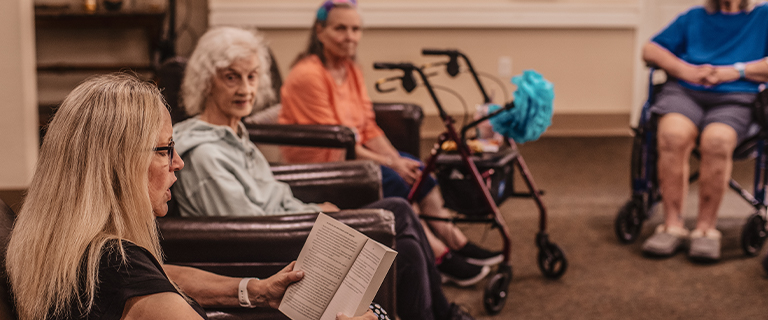Caring for a senior loved one is a rewarding experience, filled with moments of joy and connection. However, it can be difficult to provide for an older loved one by yourself, and there may be a time when you need to consider a move to senior living.
There are 3 key levels to senior living:
- Independent living
- Assisted living
- Memory care
So which one is right for your loved one?
What is Independent Living?
For many older adults, independence is a valuable thing. However, staying in their own home can be a burden; with constant maintenance, cleaning, and bills, homeownership requires a significant amount of time and energy.
When a senior values their independence but wants a more maintenance-free lifestyle, independent living is ideal. Independent living communities offer a home in a community where your loved one can enjoy their time without worrying about the constant stress of managing their own home. These communities offer a range of services and amenities, including:
- Beautiful outdoor areas
- Organized group activities
- Community spaces
- Chef-prepared meals
- Fitness centers
- Transportation services
These communities aim to nurture your loved one’s personal growth in an environment where they can thrive.
Who Should Move to Independent Living?
Independent living is ideal for seniors who:
- Enjoy socializing and participating in community activities.
- Want to downsize from a larger home to a more manageable living space.
- Seek a maintenance-free lifestyle with access to various amenities.
- Desire a safe and secure environment without the burdens of homeownership.
For those who wish to celebrate life each day, independent living provides an enriching environment where they can spend their time as they choose. It’s an excellent option for seniors looking for a more engaging social lifestyle!
What is Assisted Living?
Sometimes, age can bring along unique challenges that make some daily tasks more difficult than they need to be. Some seniors may find it more difficult to stay on top of their housekeeping, while others struggle to manage their own medication. So what if your loved one wants to stay independent where they can, but needs some help here and there to maintain their quality of life?
If this is the case for your loved one, it might be time to consider assisted living. This is a special type of care offered by many senior living communities, and it’s designed to step in to serve seniors when a daily activity is more difficult than it once was. These communities offer support with tasks including:
- Mobility and transportation
- Medication management
- Bathing
- Grooming
- Dressing
- Housekeeping
Meanwhile, your loved one gains access to all the on-site events, services, and amenities, offering a community where they can feel supported and at home. Assisted living offers a careful blend of caregiving and independence to give your loved one a dignified, supported lifestyle.

Who Qualifies for Assisted Living?
Assisted living is an excellent choice for seniors who:
- Need help with daily activities but do not require 24/7 medical care.
- Experience difficulties with mobility or have chronic health conditions.
- Seek a supportive environment where they can maintain a level of independence.
- Benefit from having access to professional care and social opportunities.
If this sounds like your loved one, a move to assisted living can be an excellent way to improve their quality of life.
What is Memory Care?
Memory care is a specialized type of long-term senior living with a key focus in mind—to address the needs of seniors living with dementia and memory impairment. These conditions can pose unique challenges, but memory care can help support seniors living with cognitive decline in an environment that truly caters to their needs.
In memory care, your loved one can celebrate life every day in a community designed to help every step of the way. These communities offer:
- A structured environment
- Additional safety features
- Specially-trained caregivers with extensive experience serving seniors living with cognitive decline
- Engaging activities tailored to cognitive needs
- Therapy programs designed to support cognitive function and overall well-being
A move to memory care is a way to support your loved one in a way that can genuinely make a difference. Every aspect of these communities is designed to support your loved one in their everyday life. From the teams on-site to the physical environment itself, the benefits of memory care can’t be overstated.
When is it Time to Move to Memory Care?
Conditions like dementia can often develop subtly, and may not show any obvious signs at first. It’s easy to mistake this condition for simple age-related cognitive decline, so try to watch out for:
- Frequent confusion or disorientation that poses safety risks.
- Difficulty managing daily tasks such as meal preparation and personal hygiene.
- Wandering or getting lost in familiar places.
- Increased anxiety, agitation, or aggression.
- A need for specialized medical care and support services.
In memory care, your loved one’s personal growth will be nurtured. It’s an excellent way to make a difference in your loved one’s life by providing them with a safe, engaging, and supportive environment uniquely tailored to meet their individual needs.
Get Your Loved One the Care They Deserve
Senior living offers a unique way to show your loved one how much you care. At Parsons House Preston Hollow, your loved one can celebrate life every day being surrounded by unconditional love and support. Our community can give your loved one the care they deserve, so book a tour with us today! It’s the first step towards finding your loved one’s future home.



